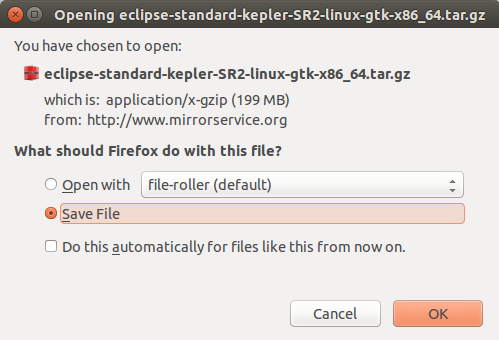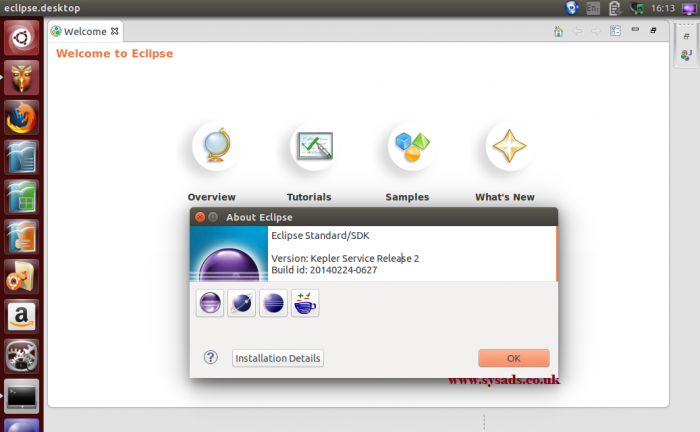Install latest Eclipse IDE in Ubuntu 14.04, 13.10
Eclipse Kepler 4.3.2 SR2 is the most recent release from the Eclipse top-level project. It contains what you need to build applications based on Eclipse technology, including integrated development environments IDE, and rich client applications using the Eclipse Rich Client Platform RCP. The Eclipse Kepler provides superior Java editing with Java Development Tools, Plug-in Development Environment, Git Team provider, and much more.
Step 1: Install Java (JRE/JDK)
- First install Java 7 and above if not installed
$ sudo apt-get install openjdk-7-jre
or
$ sudo apt-get install openjdk-7-jdk
Step 2: Download Eclipse Kepler IDE
- Next button below to download the latest Eclipse IDE (32bit or 64bit) package. There are different packages depending on what package you want.
- Click Save File

- From terminal, run command to move downloaded package to /opt directory
$ sudo mv Downloads/eclipse-* /opt/
Step 3: Extract Package
- Run the following commands. Ensure the file-name is correct on your version
$ cd /opt/ $ sudo tar -xvf eclipse-standard-kepler-SR2-linux-gtk-x86_64.tar.gz
Step 4: Create new Desktop File
- Create a new desktop file called ‘eclipse.desktop’ in /usr/share/applications/
$ sudo gedit /usr/share/applications/eclipse.desktop
- Then add the following lines to the above file and save
[Desktop Entry] Name=Eclipse Type=Application Exec=/opt/eclipse/eclipse Terminal=false Icon=/opt/eclipse/icon.xpm Comment=Integrated Development Environment NoDisplay=false Categories=Development;IDE; Name[en]=eclipse.desktop
According to cheour, I changed the exec line in the gedit file from
Exec=/opt/eclipse/eclipse
to
Exec=env UBUNTU_MENUPROXY= /opt/eclipse/eclipse
and it worked right
Step 5: Additional Tasks
- Run the following command to automatically install it in Unity
sudo desktop-file-install /usr/share/applications/eclipse.desktop
- Create a symlink in /usr/local/bin
cd /usr/local/bin/ sudo ln -s /opt/eclipse/eclipse
- For Eclipse icon to be displayed in dash, run following command
sudo cp /opt/eclipse/icon.xpm /usr/share/pixmaps/eclipse.xpm

- Launch Eclipse

郑重声明:本站内容如果来自互联网及其他传播媒体,其版权均属原媒体及文章作者所有。转载目的在于传递更多信息及用于网络分享,并不代表本站赞同其观点和对其真实性负责,也不构成任何其他建议。






































